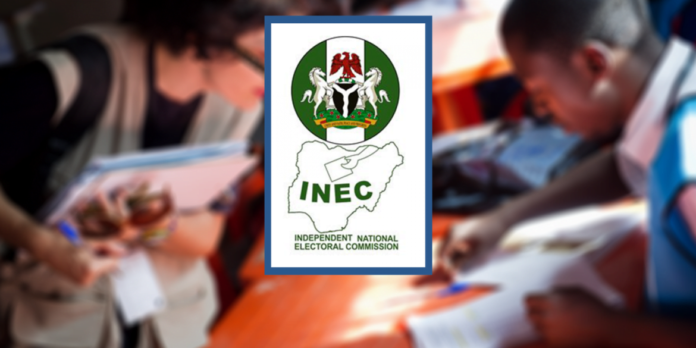The Chairman of the Independent National Electoral Commission (INEC) has disclosed that the commission has begun to implement recommendations made by the various observer missions that monitored the 2023 general elections.
The INEC Chairman disclosed this when he received members of the ECOWAS Network of Electoral Commissions (ECONEC) in Abuja. He said the recommendations by the ECOWAS Election observers that monitored the 2023 general election form part of the Commission’s 142 recommendations for electoral reform, which resulted from wide-ranging consultations with critical institutions and stakeholders, a copy of which is already available on our website.
The ECOWAS Network of Electoral Commissions (ECONEC) are in Nigeria to follow up on the implementation of the recommendations made by the ECOWAS Election Observation Mission (EOM) to the last General Election in Nigeria.
He commended ECOWAS for partnering with ECONEC in deploying follow-up missions to member countries, always led by a chairperson of an electoral commission.
“In April this year, just three months ago, I was involved in a similar mission to the Republic of Gambia together with my colleague from Sierra Leone and some of the election experts present today. Today, it is our turn to host our colleagues from Liberia and Ghana, leading a team of international election experts. In this sense, today’s mission is a routine practice but very critical to electoral democracy in our region.
He said further that election observation missions always make their findings and recommendations public, while also deploying follow-up missions on the implementation of their recommendations, saying “the Commission is glad that ECOWAS, which deployed both long-term and short-term EOM, recognises that the election is a multi-stakeholder responsibility.
“Consequently, for Nigeria’s 2023 General Election, it made 37 recommendations for consideration by seven critical institutions and stakeholders in the electoral process. Of these recommendations, 13 are addressed to INEC while 24 require action by other institutions and stakeholders such as the National Assembly, the Nigeria Police Force (NPF), the National Broadcasting Commission (NBC), the National Information Technology Development Agency (NITDA), civil society organisations, the Nigeria Union of Journalists (NUJ) and political parties under the auspices of their umbrella body, the Nigeria Inter-Party Advisory Council (PAC).
He disclosed that the Follow-up Mission will interact with the National Identity Management Commission (NIMC).
According to the INEC boss “Of the 13 observations specifically addressed to INEC, the Commission has considered all the recommendations that require administrative action to implement while waiting for the conclusion of the ongoing legal review by the National Assembly on aspects of the recommendations that require legislative intervention.
“The Commission has prepared a detailed response on each of the 13 observations, most of which are already contained in our 142 recommendations for electoral reform, which resulted from wide-ranging consultations with critical institutions and stakeholders, a copy of which is already available on our website.
“The review report as well as the main 2023 General Election report and other relevant documents, are also available on our website. Nevertheless, hard copies of these reports and documents have been included in your document bags for this meeting”.
Head of the delegation, Mrs Davidetta Browne-Lansanh, said the joint post-2023 election follow-up and needs assessment mission to Nigeria is a peer-to-peer review of the team’s presence in Nigeria during the 2023 elections, but more importantly, the recommendations that we offered, which were outlined in a report of our visit here.
“We have come to see how best INEC has implemented those recommendations. We anticipate that during our engagement, we may be able to understand reasons for some of the issues that came out of the 2023 elections and how INEC was able to navigate in a way that it has found answers to those challenges that abound during the 2023 elections.
“We see this mission as a lesson learned, not just for INEC Nigeria, but also for our own institutions, our own election management bodies, because as we know, problems or challenges that are faced by any election management body are often faced by election management bodies throughout our region.
“The fact that we can sit down and talk about what we went through and how it impacted our work during elections, I think we may be able to use those recommendations again to better situate our individual election management bodies when we return to our various countries. So let me say on behalf of the team that we are happy to be here and we are happy for your warm welcome all the time.
“But let me go further to say that Liberia, the National Elections Commission, appreciates you in particular for your stance in ensuring that we do a good job as we have done here in Nigeria.
“More importantly, INEC has supported through material sharing with the National Elections Commission in Liberia. Because of your intervention, we now have an ICT room, basically supported by your efforts. And I get emotional, sorry, when I speak about these years, because when we needed support, we realised that ECONEC was there for us.
“Through ECONEC and its principles and ideals, Nigeria actually responded to our needs. So I want to ask you to give a round of applause for Professor Mahmood and the Commissioners and the team of INEC Nigeria. The mission here is to learn.
“We want to learn what happened, so that we can use your expertise in dealing with the problems and challenges to better situate our election management bodies and processes. Thank you to all of you, and we wish to have better, sustainable election management bodies throughout West Africa and the world.”

